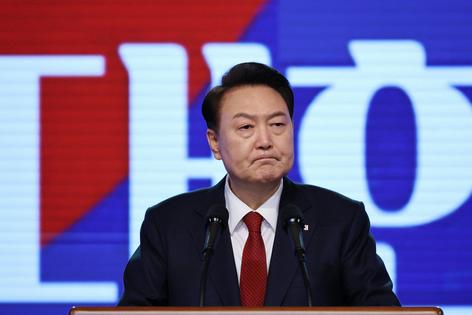South Korean President Yoon faces foreign policy challenges after the National Assembly election
Published in News & Features
South Korea’s parliamentary election of April 10, 2024, was widely seen as a referendum on President Yoon Suk Yeol’s first two years in office.
That being the case, the nation collectively expressed its strong disapproval.
With a relatively high turnout of 67%, voters handed Yoon’s conservative People’s Power Party defeat, with its share of the 300-seat National Assembly dropping from 114 to 108.
The opposition Democratic Party retained its large majority in the National Assembly, winning 175 seats and maintaining control in the populous metropolitan areas of Seoul, Incheon and Gyeonggi provinces. Voters also delivered a disappointing outcome for most third-party candidates, the exceptions being the Rebuilding Korea Party, which campaigned as more combative opposition to the DP, and the New Reform Party, which broke away from the ruling PPP earlier this year.
As a political scientist with a focus on East Asia and international affairs, I believe the election results will have ramifications on Yoon’s foreign and domestic agenda during the remainder of his term.
Yoon had hoped the election would end the political gridlock that has stymied his first two years as president.
Throughout that time, the opposition has held a legislative majority. Subsequently, Yoon’s government has seen key parts of its agenda for education, labor and pension reforms blocked. Yoon has also vetoed multiple bills passed by the opposition-controlled legislature.
But the election saw the DP and other opposition parties amass 192 seats, just short of a veto-proof, two-thirds majority. As such, President Yoon again faces a divided government for the remainder of his term. In fact, he will be the only South Korean president whose party has failed to control the National Assembly at any time during the five-year presidential term.
A better parliamentary outcome for Yoon’s party would have bolstered the chances for the government’s legislative agenda on pressing domestic issues, such as addressing the country’s declining birthrate, high inflation and expanding medical student enrollment, as well as relaxing business regulations.
Instead, the Yoon government is more likely to be on the defensive after the election. Opposition parties have vowed to investigate alleged stock manipulation involving first lady Kim Keon Hee and probe former Defense Minister Lee Jong-sup over claims that he influenced an earlier report into the drowning death of a Korean marine.
...continued








Comments